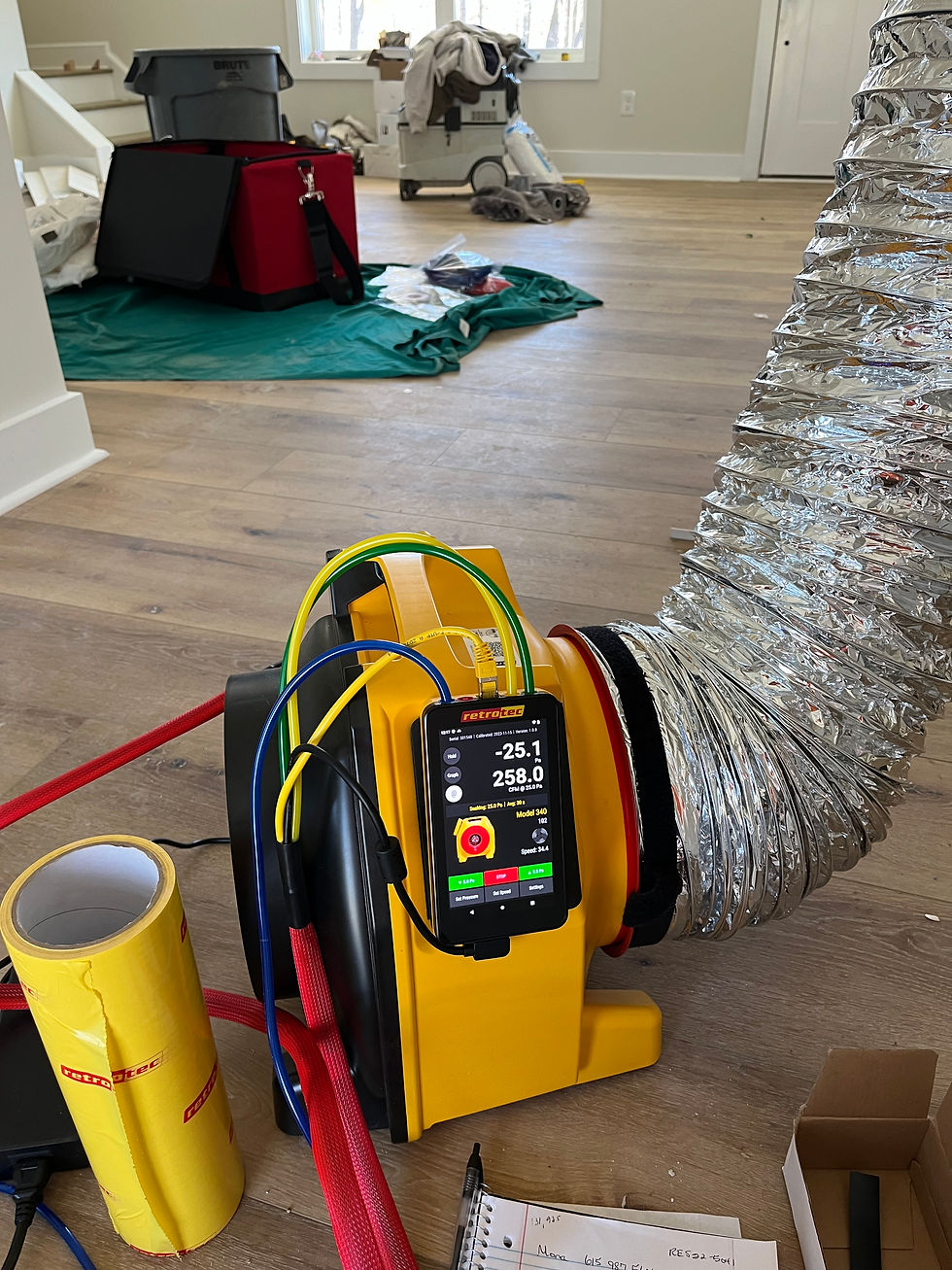Virginia Requires Residential Duct Testing to Meet Building Code Compliance
- vablowerdoortestin
- May 2
- 3 min read
In Virginia, maintaining residential building standards is essential to ensure the safety, comfort, and energy efficiency of homes. One key aspect of this is Virginia Residential Code Compliance, which includes a variety of requirements, one of the most important being duct testing. Duct systems play a crucial role in a home's HVAC (Heating, Ventilation, and Air Conditioning) efficiency, and ensuring they meet building code standards is mandatory for new construction and some renovation projects.

Virginia Duct Testing Requirement
Under the Virginia Residential Code, builders are required to conduct duct testing to verify that the ventilation systems in new homes are free of significant leaks. The purpose is to ensure that air flows through the system efficiently, reducing waste and improving the overall energy efficiency of the home. This requirement became an essential part of the construction process to align with green building practices and to help homeowners save on energy costs in the long run.
Duct testing is performed by professionals who measure the tightness of the ducts and the efficiency of air distribution. This step is a necessary part of meeting the building code compliance in Virginia, ensuring the home meets the minimum efficiency standards.
Benefits of Residential Duct Testing
Duct testing offers numerous benefits that go beyond just code compliance:
Energy Efficiency: By identifying leaks and areas where the ductwork may be poorly sealed, duct testing ensures that air is distributed efficiently, helping homeowners save money on heating and cooling costs.
Improved Indoor Air Quality: Properly tested and sealed ducts reduce the chances of dust, mold, and other pollutants entering the home, resulting in cleaner air for residents.
Enhanced Home Comfort: With a properly sealed duct system, temperature consistency is improved across all rooms, making the home more comfortable year-round.
For homeowners and builders alike, duct testing is an investment in energy conservation, health, and long-term savings.
Who is Responsible for Duct Testing?
In Virginia, the responsibility for duct testing typically lies with the builder or contractor during the construction of a new home. It is their duty to hire qualified professionals who can conduct the tests and provide documentation proving compliance with the Virginia Residential Code.
If you're a homeowner looking to ensure compliance with the Virginia Residential Code, it’s important to work with a rental management company near me or a reputable contractor who understands the testing process can be managed to ensure precise and reliable results.

How Duct Testing is Performed
The process of duct testing typically involves using specialized equipment to measure how well air travels through the ducts. The most common method involves a blower door test to pressurize the home, then measuring the airflow through the ductwork. The test checks for leaks, ensuring that the home’s ventilation system is working as it should.
Professionals use advanced testing tools to measure these leaks, ensuring that the duct system operates efficiently and within the code’s specified limits. If significant leaks are found, repairs will be necessary to meet compliance before moving forward with the construction process.
To learn more about professional duct testing, you can check out the Energy Testing Services offered by VA Blower Door Testing. Their team can help ensure your home meets all energy efficiency standards and residential codes.
Compliance and Penalties
Ensuring Virginia Residential Code Compliance with duct testing is not optional for new builds or certain renovations. Failing to perform the necessary tests can lead to fines, delays in construction, and additional work to bring the duct system up to code. Homeowners who skip this step may face issues when trying to sell the home or during inspections.
Compliance with the Virginia Residential Code ensures that the home remains safe, energy-efficient, and healthy for its occupants. Moreover, passing duct tests can add value to the property by demonstrating its energy efficiency to potential buyers.
Final Thoughts on Virginia Duct Testing for Code Compliance
In summary, Virginia Residential Code Compliance and Virginia duct testing are crucial for ensuring a home is built to the highest standards of energy efficiency and indoor air quality. It’s vital for both builders and homeowners to understand the importance of this step in the construction process. Duct testing not only guarantees that a property is in compliance with building codes but also offers lasting benefits such as energy savings and improved comfort.
If you're looking for professional help to ensure that your home meets these standards, talk to the professionals at VA Blower Door Testing. Their services can help you navigate the process, ensuring your home is ready to meet all of Virginia’s residential requirements.
For more information about how to get started with duct testing, or to schedule a consultation, visit VA Blower Door Testing’s Energy Testing Services.




Comments